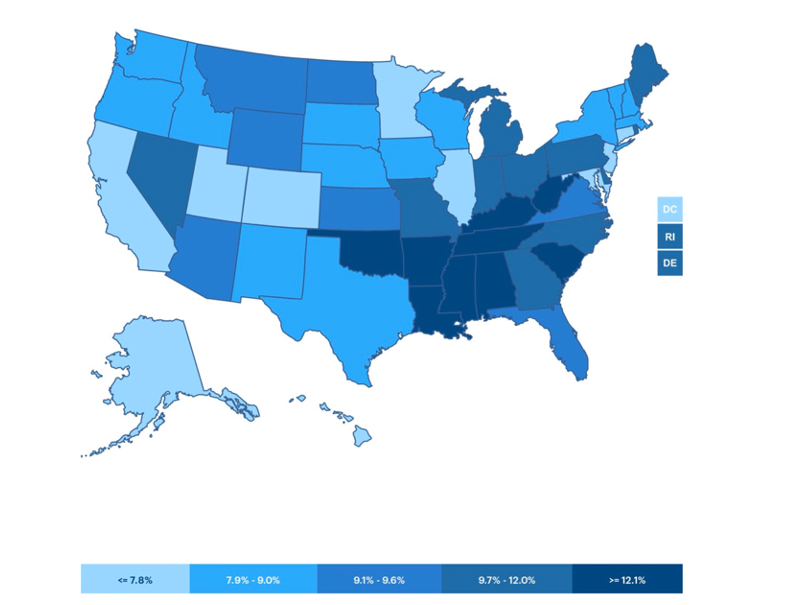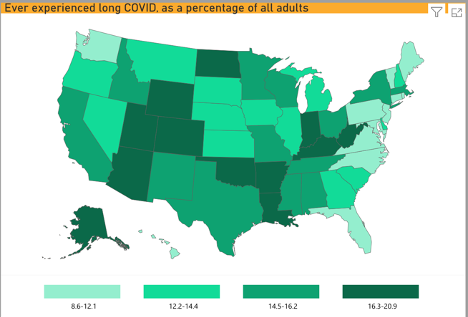Providing paid sick leave benefits all workers because everyone gets sick. Sick days allow workers to take care of their needs, and the needs of their families. However, only 38% of workers in the private sector have access to earned paid sick leave, leaving roughly 1.5 million workers in North Carolina with no access to paid leave. But what about workers who develop chronic illnesses? In lieu of the pandemic, many Americans developed long COVID-19, and have still not been able to get completely healthy before returning. Some were unable to return to work at all. 10.8% of North Carolinians live with two or more chronic illnesses, and may not qualify for medicaid. Some workers, like Ryan Flanagan, had pre-existing conditions that put them at risk during the pandemic.

📸 Source: CDC Behavioral Risk Factor Surveillance System. Percentage of adults who had three or more of the following chronic health conditions: arthritis, asthma, chronic kidney disease, chronic obstructive pulmonary disease, cardiovascular disease (heart disease, heart attack or stroke), cancer (excluding skin), depression and diabetes.
Ryan Flanagan, 29, caught a bad case of pneumonia in the winter of 2017 — a few years before the COVID-19 pandemic, leaving him at risk for a serious case of COVID-19. When Ryan got pneumonia, he was working for Honda. Lack of sick leave was the reason why he left. “I quit Honda because I literally had never been that sick. I remember my boss calling me. I had been out for a week or so. One boss would check on me and ask how I was doing. A more senior boss would ask when I was coming back to work.” Ryan knew something was seriously wrong but didn’t have the financial stability to go to the doctor, despite having health insurance. He tried to handle it at home and felt better temporarily. A few days went by, and the symptoms returned with a vengeance, leaving him feeling as if he was suffocating. After a doctor visit, the doctor told him with his oxygen levels he would have died if he did not come in.
“A lot of people know they are very sick, but don’t know if they can accumulate those bills,” Ryan says, even if they have health care with a decent paying job. Ryan went from hardly ever using a sick day to using seven sick days in a row, and he was forced to choose whether to keep working at his current position, and being able to cover basic expenses, or continuing to take unpaid leave and embrace economic distress. His lungs never went back to normal. His doctor warned him that if he got pneumonia again, that it could possibly kill him. This left him feeling uncertain at his new position at Texas Steakhouse in 2020 when the COVID-19 pandemic hit. Yet, he was one of the first people back at the restaurant when it opened back up. He worked his way up to a salaried manager with great benefits and 14 sick days, while working less hours than he worked at Honda. 40% of workers in North Carolina can only accumulate unpaid leave. Workers like Ryan, frequently find themselves having to make a choice between going to work unwell or staying home with less financial security.
Nina La’Shae, 27, worries about losing her disability, getting the right coverage she needs to afford treatments and medication, and following her passion to become a nurse. She has been living with chronic kidney disease since 2012. Her kidneys failed in 2018, and she has been on dialysis ever since. She gets treatment on Tuesdays, Thursdays, and Saturdays for four hours. “It’s been hard to find and really challenging to find a job that can honestly understand what I deal with. I’ve had jobs that I love that I had to leave, and they didn’t understand, because I do dialysis. A lot of those things aren’t taken into consideration with the employers that I have had.” She currently works for a pharmaceutical company with a manager who is understanding and willing to work with her despite having no control over missing work due to her demanding care routine.
Nina was 15 years old when she was diagnosed with chronic kidney disease, and when her kidneys failed, she obtained disability. “I applied for so long, but they want you on your dying bed before they approve you.” Her condition could have been avoided if she qualified for affordable health insurance and was able to pay for her medication before her kidneys failed. Her dialysis treatments costs $400 dollars a day, without insurance. Some people must go to dialysis every day and would die without the treatment.
Her current insurance still does not cover the cost of all her medications, but she would lose her disability if she obtained coverage from a second insurance provider to cover these costs. Despite mourning not living a normal 20-something year old’s life, Nina is determined to become a nurse. She is continuing her education while working to have the career that she wants to have. The state and the federal government have the power to make sure the path to achieving her dreams is protected with good policies that guarantee workers more paid sick leave, and affordable health care.
Mia Ives-Rublee is the Director of Disability Justice Initiative at the Center for American Progress, and she expresses the need for a standard federal policy that ensures paid leave for all workers. Workers like Ryan and Nina, who are living with chronic illnesses and/or disabilities would benefit from such legislation.
“The problem is the conversations around paid leave and family leave is that so much of it is focused on family care leave rather than family care leave and medical leave. It’s not going to fully help people living with chronic illness.” Mia emphasizes that there are more people who are struggling with chronic illness in the workforce because of COVID-19.
“COVID has been a mass disabling event,” says Mia about the exponential increase of disabled people in the workforce. According to the CDC, one in thirteen Americans have long COVID-19 symptoms, meaning that their symptoms persisted for three or more months after contracting the virus.
The Household Pulse Survey from the National Center of Health Statistics completed in partnership with the Census Bureau uncovered that 10.7% of North Carolinians in October 2022 reported developing long COVID. Working remotely and having a hybrid in person and online work schedule are two ways many companies are continuing to combat the impact of COVID-19, but not all industries can offer remote work. Federal and state governments have the power to guarantee paid leave and could incentivize companies to do so.
“In terms of NC, I think the first thing we need to address is the right to work, which is basically a way to take away power from unions. That makes it much more difficult for employees to be able to get together and bargain with their employer,” says Mia. Collective bargaining allows employees to negotiate terms with their employers about leave, benefits, and more with the support of a union. “A lot of people don’t understand that worker power greatly impacts disabled people. It’s extremely important that we get rid of that law, that makes it difficult for unions to organize.” Mia also relays that misclassification of workers is a huge detriment to worker power. Employers classify their employees as independent contractors to avoid payroll taxes and limit employee benefits. The Wage and Hour Division investigates if an employee has been misclassified and has resources to help workers hold their employers accountable.
It’s time to expand the conversation about guaranteeing paid leave for the workforce in North Carolina, not just for family care, but for the reality of many Americans living with chronic conditions. North Carolina can expand the opportunities for people with disabilities by addressing right to work laws.
 Aminah is an integrative researcher, activist for Indigenous and Black issues, and advocate fighting violence against women and children. Aminah grew up in Pembroke, North Carolina and is a member of the Lumbee Tribe. Beyond being a Division I track and field athlete in college, Aminah has also channeled her energies into her education having studied Biology at East Carolina University and completing a Masters in Physiology and Biophysics with a concentration in Integrative Medicine from Georgetown University. Her research with Breaths Together for a Change centers blending wisdom traditions, Indigenous epistemology, with Western epistemology to test how mindfulness can reduce racial bias and heal historical trauma. She has served as a Domestic Violence and Sexual Assault victim advocate, a board member for the Missing and Murdered Indigenous Women NC Coalition, and created Good Medicine Woman LLC to address gaps in knowledge about Indigenous culture. She ran for NC House District 47 in 2022, and is an ECU 40 under 40 Leadership Award recipient.
Aminah is an integrative researcher, activist for Indigenous and Black issues, and advocate fighting violence against women and children. Aminah grew up in Pembroke, North Carolina and is a member of the Lumbee Tribe. Beyond being a Division I track and field athlete in college, Aminah has also channeled her energies into her education having studied Biology at East Carolina University and completing a Masters in Physiology and Biophysics with a concentration in Integrative Medicine from Georgetown University. Her research with Breaths Together for a Change centers blending wisdom traditions, Indigenous epistemology, with Western epistemology to test how mindfulness can reduce racial bias and heal historical trauma. She has served as a Domestic Violence and Sexual Assault victim advocate, a board member for the Missing and Murdered Indigenous Women NC Coalition, and created Good Medicine Woman LLC to address gaps in knowledge about Indigenous culture. She ran for NC House District 47 in 2022, and is an ECU 40 under 40 Leadership Award recipient.


There are no comments
Add yours